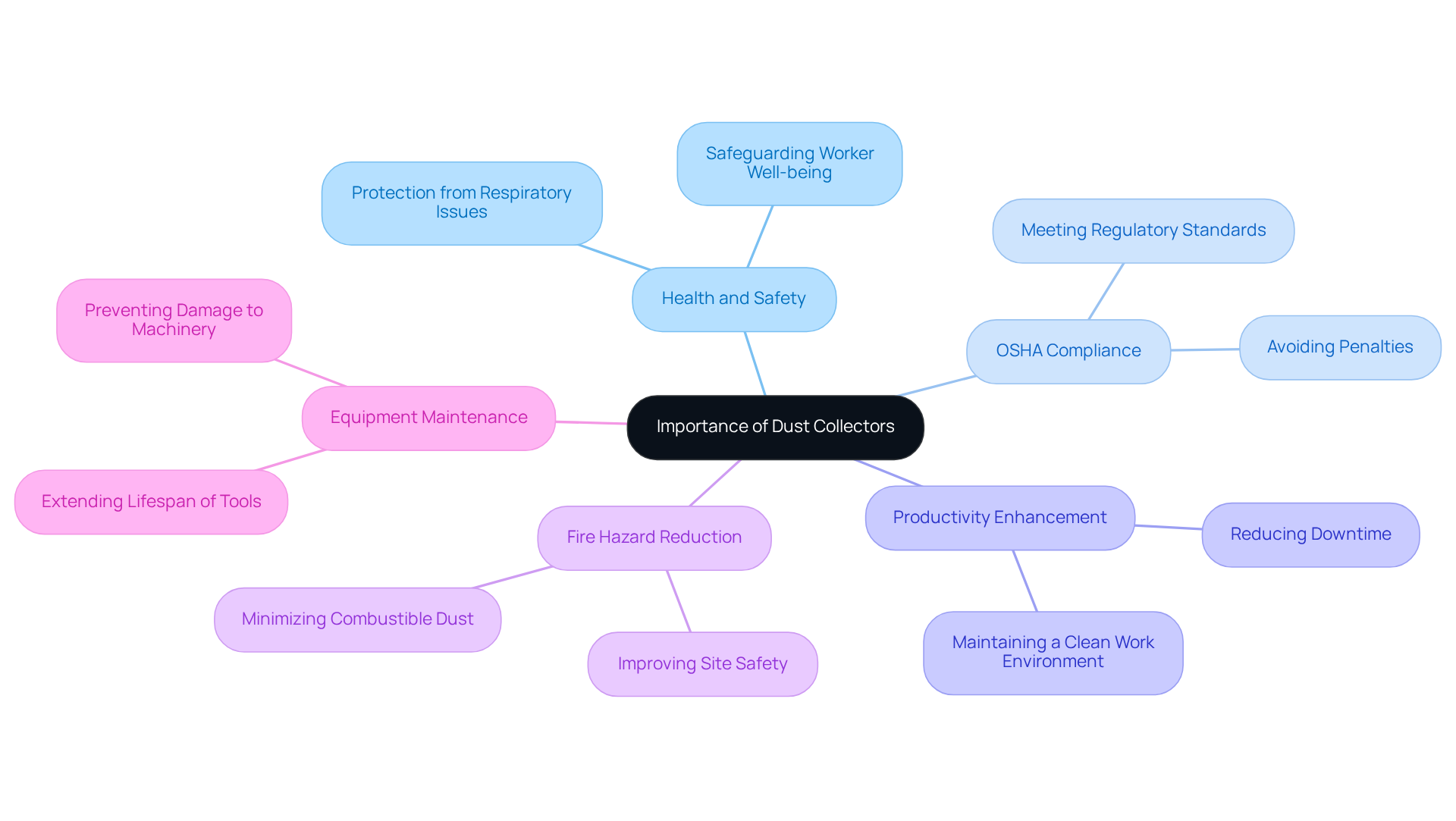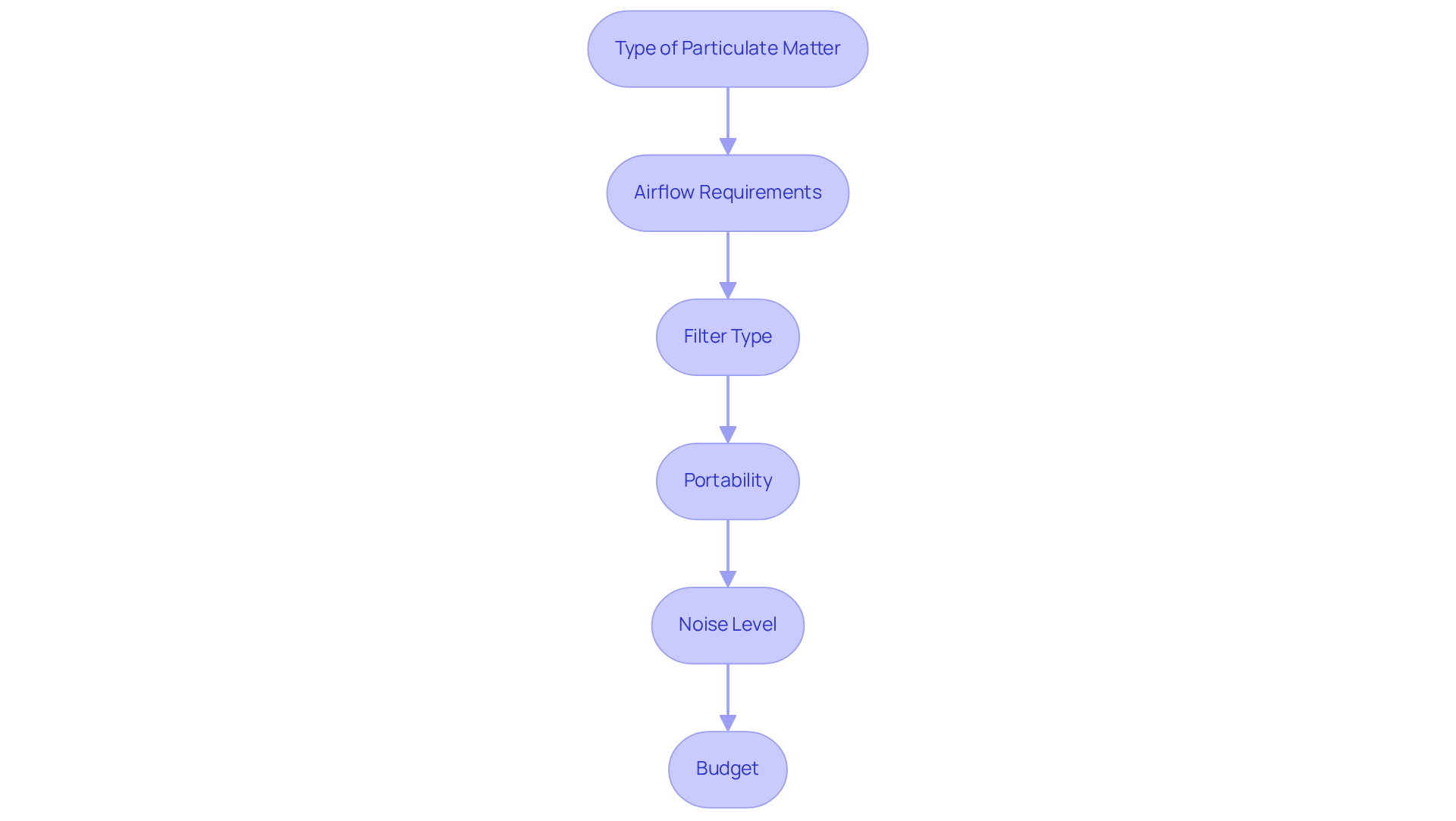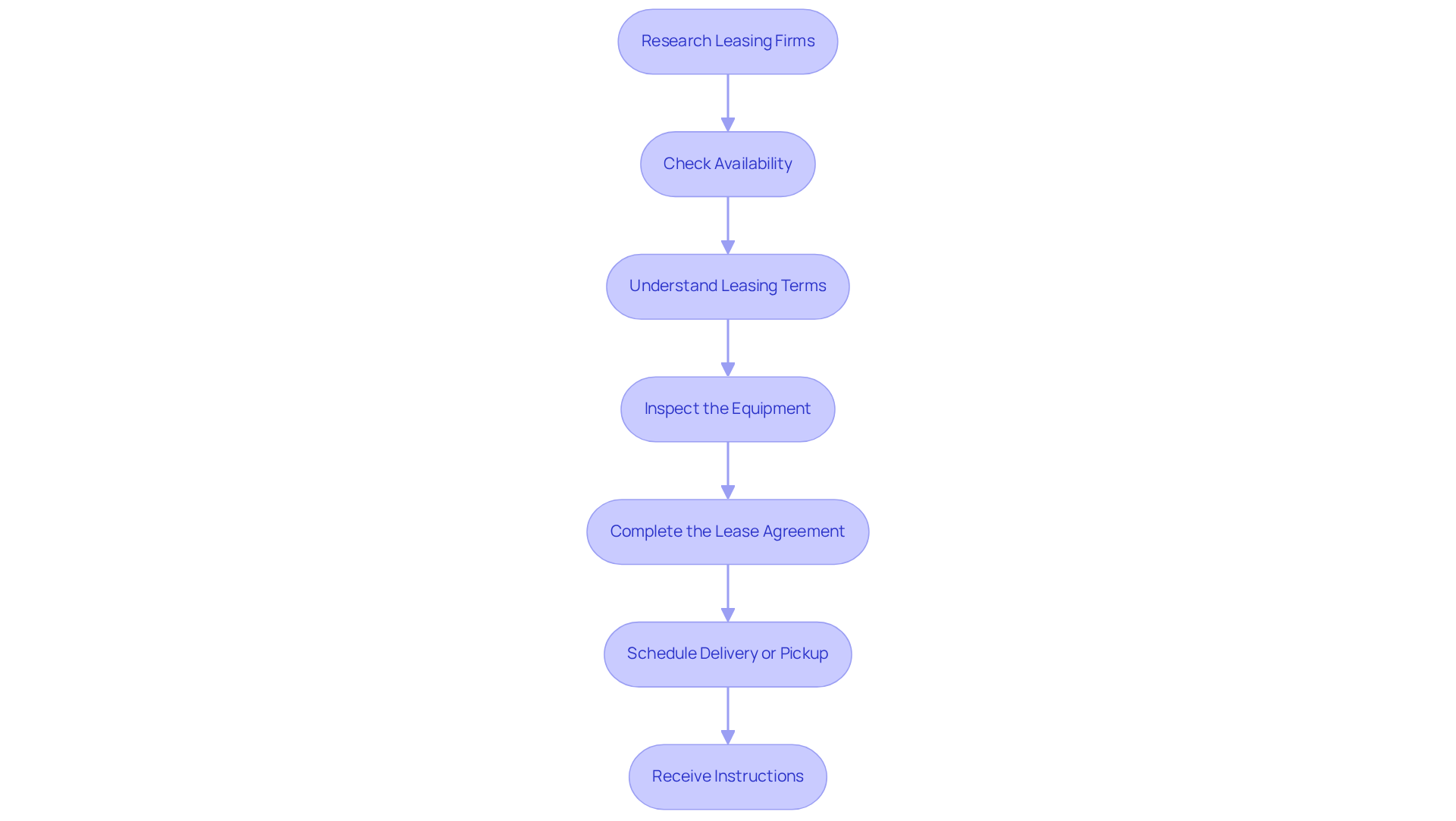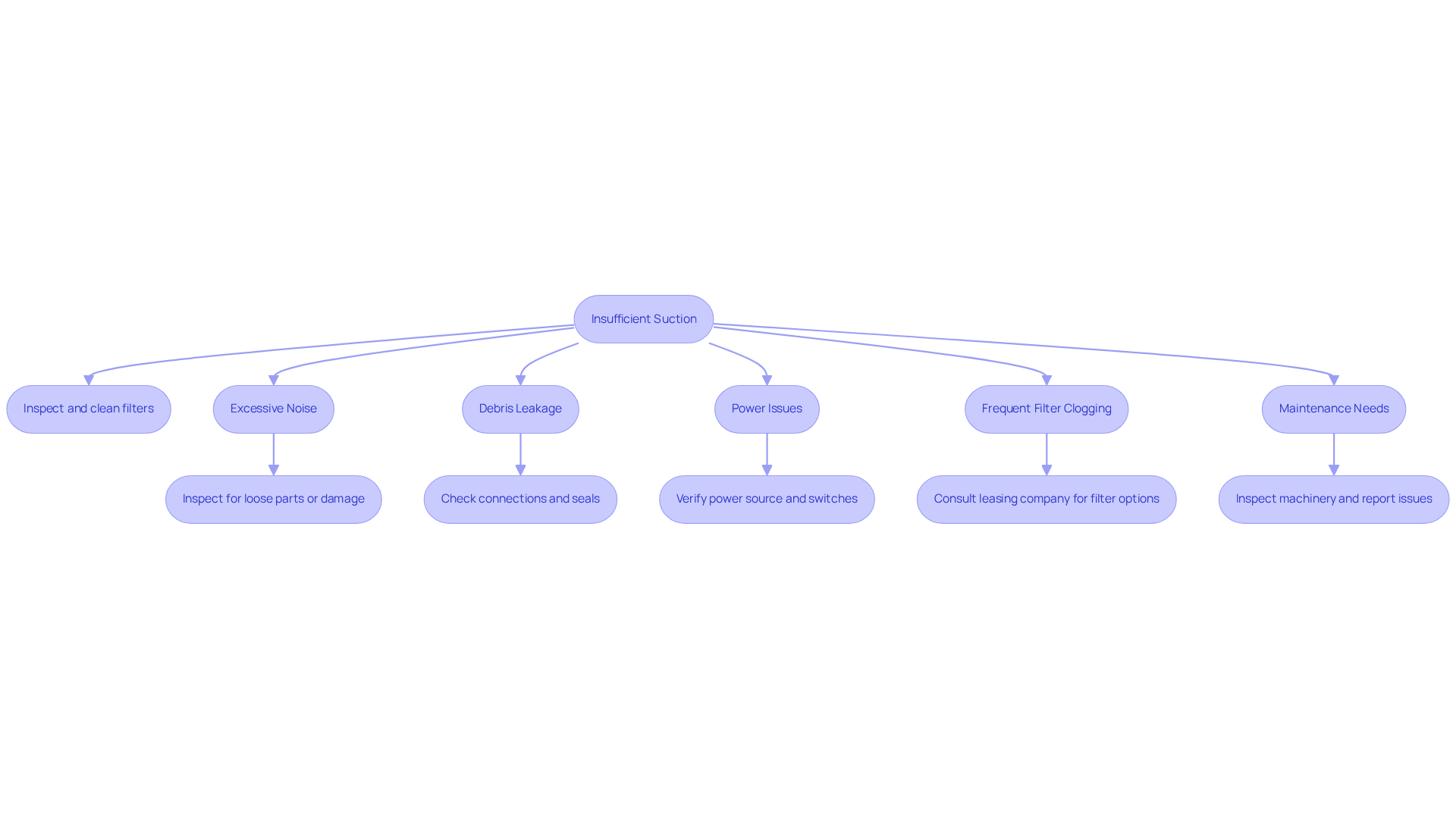Overview
Renting dust collector equipment is a systematic process that involves several key steps:
- Researching firms
- Checking availability
- Understanding leasing terms
- Inspecting equipment
- Completing agreements
- Receiving usage instructions
This article outlines these steps, emphasizing the significance of selecting the right dust collector tailored to specific project needs. Such careful selection not only ensures compliance with safety regulations but also enhances overall productivity on construction sites.
Key Highlights:
- Dust collectors are essential for removing harmful particles from the air in construction, protecting worker health and safety.
- Compliance with OSHA regulations is crucial, and effective dust collection reduces respiratory issues and fire hazards.
- A clean work environment enhances productivity and extends the lifespan of tools and machinery.
- Key factors for choosing a dust collector include type of particulate matter, airflow requirements, filter type, portability, noise level, and budget.
- The rental process involves researching firms, checking availability, understanding leasing terms, inspecting equipment, completing agreements, scheduling delivery, and receiving usage instructions.
- Common issues with rented dust collectors include insufficient suction, excessive noise, debris leakage, power issues, frequent filter clogging, and maintenance needs.
- Utilising technology like iCue can help monitor equipment performance and prevent issues, enhancing efficiency and reducing downtime.
Introduction
Dust collectors are essential for ensuring safety and efficiency on construction sites, effectively eliminating harmful particles from the air. Their importance transcends mere regulatory compliance; they safeguard workers' health, boost productivity, and extend the lifespan of equipment. However, the rental process can be challenging, with numerous factors to weigh, including the type of particulate matter and budget constraints. To navigate this landscape successfully, project managers must take proactive steps to select the appropriate dust collector and sidestep common pitfalls in the rental process.
Understand the Importance of Dust Collectors in Construction Projects
Dust extraction systems are vital in construction projects, effectively removing harmful particles and particulate matter from the air. This function is crucial not only for safeguarding the health and safety of workers but also for ensuring compliance with OSHA regulations. Efficient particle collection systems help prevent respiratory issues, reduce fire hazards, and maintain a clean work environment, which can significantly enhance productivity. Furthermore, a clean site minimizes the risk of damage to tools and extends the lifespan of instruments and machinery. Understanding these benefits is the first step in recognizing the necessity to rent a dust collector for your project.

Identify Key Factors for Choosing the Right Dust Collector
When selecting a rent dust collector, it is essential to consider several key factors that will influence your decision.
- First, identify the type of particulate matter. Understanding whether the particulate matter is hazardous, non-hazardous, or combustible will dictate the kind of collector required for your specific needs.
- Next, assess the airflow requirements; calculate the necessary airflow, measured in CFM, based on the size of the area and the type of work being performed.
- Furthermore, the filter type is crucial. Choose between HEPA filters for fine particles or cartridge filters for larger debris, depending on the demands of your project.
- It is also important to evaluate portability; determine whether a stationary or portable unit is more suitable for your job site.
- Additionally, consider the noise level of the vacuum system, especially in residential neighborhoods or confined spaces, as this can significantly impact your work environment.
- Finally, assess your budget by comparing leasing expenses against purchasing options to identify the most economical solution for your project.
By taking these factors into account, you can ensure that your choice to rent a dust collector will meet your operational needs effectively.

Follow a Step-by-Step Process to Rent Dust Collector Equipment
To rent dust collector equipment effectively, follow these essential steps:
-
Research Leasing Firms: Begin by identifying reputable leasing firms in the Dallas-Fort Worth region. EZ Equipment Leasing stands out, renowned for its specialization in construction tools and a strong commitment to customer service.
-
Check Availability: Contact EZ Equipment Rental to confirm if you can rent the dust collector model you need. They offer a diverse selection of well-maintained equipment, ensuring you find the right fit for your project.
-
Understand Leasing Terms: It is crucial to thoroughly review the leasing terms, including duration, pricing, and any additional fees for delivery or pickup. These factors can vary significantly among providers. Be mindful that businesses often have concerns regarding damages and liability issues related to leasing agreements.
-
Inspect the Equipment: Whenever possible, inspect the rent dust collector before renting. This step is vital to ensure it meets your project’s standards and is in optimal working condition.
-
Complete the Lease Agreement: Fill out the necessary paperwork, providing details such as your project timeline and payment information to finalize the lease. Accuracy here is essential for a smooth rental process.
-
Schedule Delivery or Pickup: Organize for the equipment to be delivered to your job site or plan for a pickup. Ensure this aligns with your project schedule. EZ Equipment Rental offers flexible leasing options designed to meet your specific needs.
-
Receive Instructions: Make sure to obtain clear guidelines on the safe and effective use of the dust collector. This knowledge is crucial for optimal performance and adherence to safety standards. Companies like EZ Equipment Rental frequently provide assistance on installation and usage, helping you maximize the equipment's effectiveness.
By following these steps, you can ensure a seamless rental experience, effectively managing debris on your construction projects.

Troubleshoot Common Issues in Dust Collector Rentals
When utilizing rented debris removal equipment, you may encounter several typical problems. Here’s how to effectively troubleshoot them:
-
Insufficient Suction: This often results from clogs in the filter or ductwork. Regularly inspect and clean or replace filters as needed to maintain optimal performance. Utilizing iCue technology can help monitor filter efficiency and alert you to potential issues before they escalate.
-
Excessive Noise: Increased noise levels can indicate loose parts or damaged components. Conduct a thorough inspection to identify and rectify any issues.
-
Debris Leakage: Ensure that all connections are secure and that the collector is properly sealed. This prevents particles from escaping and maintains a clean work environment.
-
Power Issues: If the unit fails to turn on, verify the power source and check that all switches are correctly positioned.
-
Frequent Filter Clogging: This may suggest that the wrong type of filter is being used for the specific dust type. Consult with the leasing company to select the appropriate filter options. The iCue technology can also help anticipate filter changes, reducing unnecessary downtime.
-
Maintenance Needs: Regularly inspect the machinery for signs of wear and tear. Promptly report any issues to the rental company to avoid incurring additional charges. Statistics indicate that each incident of hopper plugging can lead to two hours of downtime and clean-up, costing approximately $5,899 USD per incident. By addressing these common issues and leveraging technologies like iCue, you can enhance the efficiency and longevity of your equipment when you rent a dust collector.

Conclusion
Renting dust collector equipment is not merely a convenience; it is a vital step in ensuring a safe and productive construction environment. Understanding the significance of dust collectors and adhering to a structured rental process allows for effective management of airborne contaminants and compliance with essential safety regulations.
Several key factors must be considered when renting a dust collector, including:
- The type of particulate matter
- Airflow requirements
- Filter types
- Portability
- Noise levels
- Budget constraints
A step-by-step approach to the rental process is crucial, emphasizing the importance of:
- Researching leasing firms
- Inspecting equipment
- Comprehending leasing terms
Furthermore, troubleshooting common issues such as insufficient suction or excessive noise can significantly enhance the effectiveness of the rental experience.
Ultimately, prioritizing the rental of dust collector equipment is essential for any construction project. This not only supports the health and safety of workers but also contributes to the overall efficiency and longevity of tools and machinery. By taking proactive steps to select the right equipment and address potential issues, a cleaner, safer, and more productive worksite can be achieved. Embracing these practices ensures that construction projects proceed smoothly while maintaining compliance with safety standards.
Frequently Asked Questions
Why are dust collectors important in construction projects?
Dust collectors are vital in construction projects because they effectively remove harmful particles and particulate matter from the air, safeguarding the health and safety of workers and ensuring compliance with OSHA regulations.
What health benefits do dust collectors provide?
Dust collectors help prevent respiratory issues among workers by removing harmful particles from the air, contributing to better overall health and safety on the job site.
How do dust collectors impact fire hazards?
By efficiently collecting dust and particulate matter, dust collectors reduce fire hazards that can arise from the accumulation of flammable materials on construction sites.
In what ways do dust collectors enhance productivity?
A clean work environment maintained by dust collectors minimizes distractions and health risks, which can significantly enhance productivity among workers.
What is the effect of dust collectors on tools and machinery?
Dust collectors help maintain a clean site, reducing the risk of damage to tools and extending the lifespan of instruments and machinery used in construction projects.
Why is it necessary to rent a dust collector for a construction project?
Renting a dust collector is necessary to ensure effective particle collection, comply with health and safety regulations, and maintain a clean work environment, all of which are crucial for the success of a construction project.




